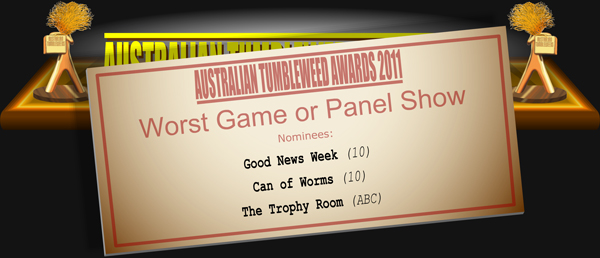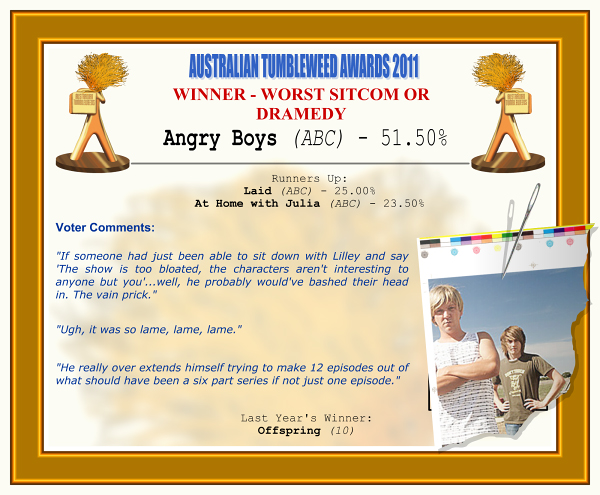Australian Tumbleweeds
Australian Tumbleweed Awards 2011 – Worst Themed Comedy
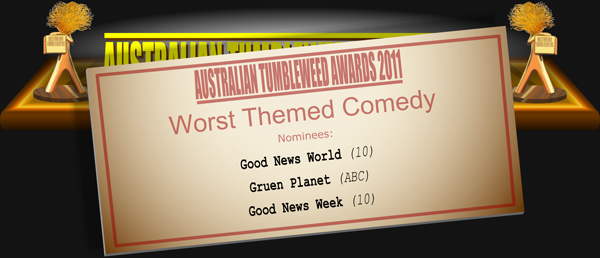 Australian comedy has a hard enough time getting laughs when absolutely anything is fair game: why would you purposely limit the targets you’re swinging at? Which is why, on even the briefest of examinations, it’s clear that while all three shows in this category claim to have firm targets in sight, they always just end up cracking jokes about anything they feel like. And good on them for it. If they’d just get around to cracking funny jokes, they might have something worthwhile to offer.
Australian comedy has a hard enough time getting laughs when absolutely anything is fair game: why would you purposely limit the targets you’re swinging at? Which is why, on even the briefest of examinations, it’s clear that while all three shows in this category claim to have firm targets in sight, they always just end up cracking jokes about anything they feel like. And good on them for it. If they’d just get around to cracking funny jokes, they might have something worthwhile to offer.
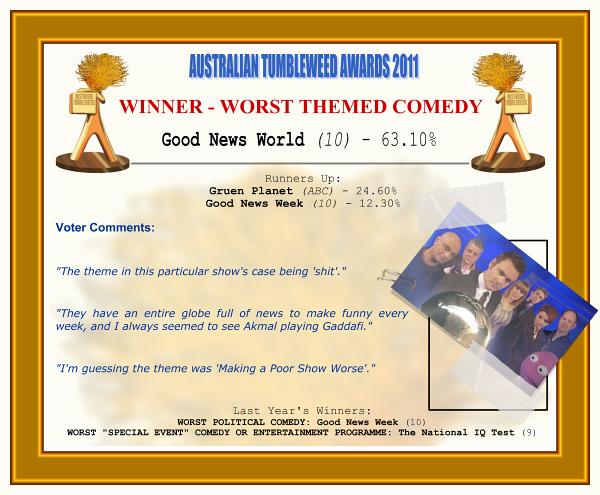 Paul McDermott is a great comedy host. He’s charming, he’s expansive, he’s got a great singing voice. He’s not someone who comes off all that well when he has to share the spotlight though, so one of the many, many mystifying choices that came from turning the stale Good News Week into the failed Good News World was to have him conduct bogus interviews and appear in sketches. And then there were all the other mystifying choices which would take at least three thousand worlds to list here so let’s just boil them down to “give Sammy J & Randy their own show and fire everyone else out of a cannon”.
Paul McDermott is a great comedy host. He’s charming, he’s expansive, he’s got a great singing voice. He’s not someone who comes off all that well when he has to share the spotlight though, so one of the many, many mystifying choices that came from turning the stale Good News Week into the failed Good News World was to have him conduct bogus interviews and appear in sketches. And then there were all the other mystifying choices which would take at least three thousand worlds to list here so let’s just boil them down to “give Sammy J & Randy their own show and fire everyone else out of a cannon”.
THE RESULTS OF THE NEXT CATEGORY, MOST IRRITATING OR POINTLESS CAMEO/GUEST APPEARANCE, WILL BE ANNOUNCED AT 5:00PM EDT.
Australian Tumbleweed Awards 2011 – Worst Coverage of Comedy
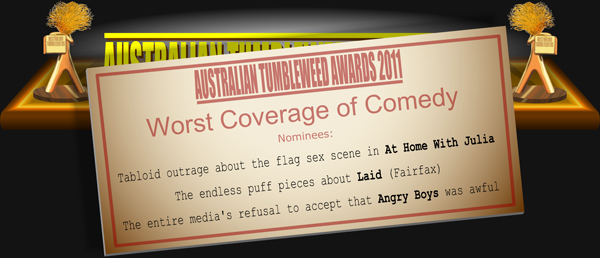 Ah, for the good old days, when the Australian media would desperately latch onto the slightest whiff of controversy about a show or comedian and never let go until someone was sacked or taken off air for a few weeks. These days even Marieke Hardy having to cough up $13,000 for “outing” the wrong man for being responsible for a disgusting hate blog barely rates a mention. Of course, the Fairfax press couldn’t say enough good things about her or her series Laid, so maybe that’s a bad example. But if the Murdoch press couldn’t find it in their hearts to seriously rally the troops around a comedy where a fake PM had fake sex on a real Australian flag, the sun had clearly set on the days when the Chaser were (metaphorically) spitting on sick kiddies with every sketch.
Ah, for the good old days, when the Australian media would desperately latch onto the slightest whiff of controversy about a show or comedian and never let go until someone was sacked or taken off air for a few weeks. These days even Marieke Hardy having to cough up $13,000 for “outing” the wrong man for being responsible for a disgusting hate blog barely rates a mention. Of course, the Fairfax press couldn’t say enough good things about her or her series Laid, so maybe that’s a bad example. But if the Murdoch press couldn’t find it in their hearts to seriously rally the troops around a comedy where a fake PM had fake sex on a real Australian flag, the sun had clearly set on the days when the Chaser were (metaphorically) spitting on sick kiddies with every sketch.
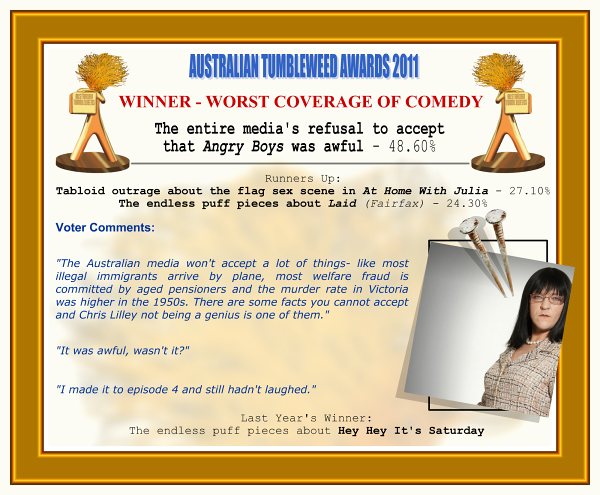 To be fair, there were a few reports on the ratings slide for Angry Boys, but for the most part the media had so firmly jumped the gun with their praise of Chris Lilley (remember that story in The Monthly calling him a genius? How about the one in The Age calling him a genius?) before Angry Boys aired they couldn’t point out the fact it was a flop without looking like they didn’t know what they were talking about. It’s interesting to note that while the claims that Lilley is a genius are still loud and strong, the example now used to back that claim up is the older (but ratings-winning) Summer Heights High. Man, there must be a lot of commentators out there praying that Angry Boys turns out to be a blip in Lilley’s career and he re-connects with audiences when his next series arrives in 2018.
To be fair, there were a few reports on the ratings slide for Angry Boys, but for the most part the media had so firmly jumped the gun with their praise of Chris Lilley (remember that story in The Monthly calling him a genius? How about the one in The Age calling him a genius?) before Angry Boys aired they couldn’t point out the fact it was a flop without looking like they didn’t know what they were talking about. It’s interesting to note that while the claims that Lilley is a genius are still loud and strong, the example now used to back that claim up is the older (but ratings-winning) Summer Heights High. Man, there must be a lot of commentators out there praying that Angry Boys turns out to be a blip in Lilley’s career and he re-connects with audiences when his next series arrives in 2018.
THE RESULTS OF THE NEXT CATEGORY, WORST THEMED COMEDY, WILL BE ANNOUNCED AT 4:30PM EDT.
Australian Tumbleweed Awards 2011 – Worst Non-Broadcast Comedy or Comedy Product
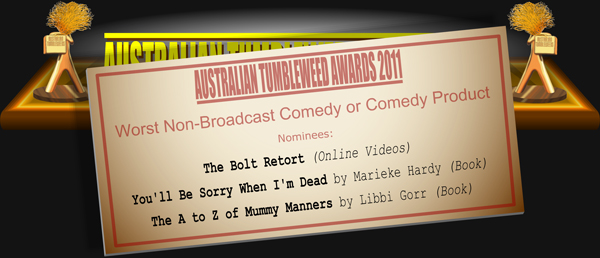 Last time we checked, The Bolt Retort’s most viewed clip on YouTube had 1,623 views. The second most viewed clip? 206 views. So presumably not only did those 1,400 people not go back for a second look, they all came over here to vote for a (in our opinion, pretty funny) five minute show by Shannon from The Bazura Project pointing out inaccuracies in Andrew Bolt’s show The Bolt Report. Hey, we just report the winners, we don’t pick ‘em.
Last time we checked, The Bolt Retort’s most viewed clip on YouTube had 1,623 views. The second most viewed clip? 206 views. So presumably not only did those 1,400 people not go back for a second look, they all came over here to vote for a (in our opinion, pretty funny) five minute show by Shannon from The Bazura Project pointing out inaccuracies in Andrew Bolt’s show The Bolt Report. Hey, we just report the winners, we don’t pick ‘em.
Remember that time Libbi Gorr had Mark “Chopper” Read on her ABC talk show? We do. Oddly, we couldn’t find any mention of that in The A to Z of Mummy Manners, her twee guide to making friends with the parents of children your children are friends with. Seriously, why bother? Most parents we know just want someone to look after their brats for a few hours, not a freakin’ soul-mate.
Marieke Hardy makes a living by talking about herself. At the heart of everything she says and does in the public eye is the conviction that it’s interesting because she’s the one doing it. Maybe she’s right? 50,000 twitter followers can’t be all wrong. Or even all actual people.
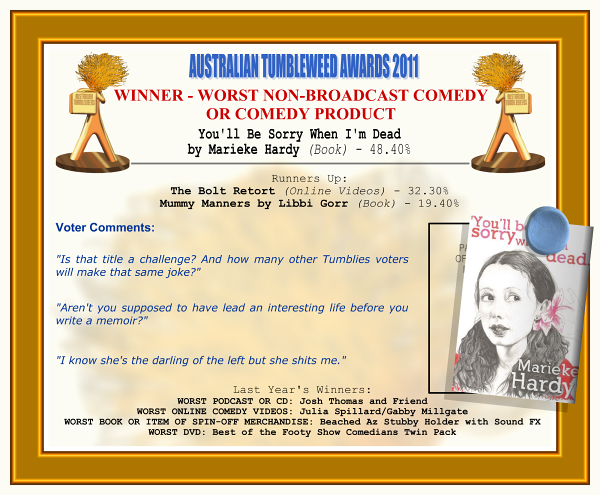 The continuing rise of Marieke Hardy is no doubt a delight for both Ms Hardy and the large number of people who wish they were her. For those trapped in an outdated way of looking at books, newspaper columns and television – as something providing the public with more than just the author’s efforts at self-promotion – it’s all a bit of a puzzle. Writing a book about your various mildly salacious relationship escapades (group sex, hiring prostitutes, etc), putting a picture of yourself on the cover, then inviting those you’ve written about to comment suggests levels of self-absorption barely sustainable by people who’ve actually achieved something with their lives. And we’re talking here about someone whose greatest achievements to date involve reviewing books on television and flashing their breasts.
The continuing rise of Marieke Hardy is no doubt a delight for both Ms Hardy and the large number of people who wish they were her. For those trapped in an outdated way of looking at books, newspaper columns and television – as something providing the public with more than just the author’s efforts at self-promotion – it’s all a bit of a puzzle. Writing a book about your various mildly salacious relationship escapades (group sex, hiring prostitutes, etc), putting a picture of yourself on the cover, then inviting those you’ve written about to comment suggests levels of self-absorption barely sustainable by people who’ve actually achieved something with their lives. And we’re talking here about someone whose greatest achievements to date involve reviewing books on television and flashing their breasts.
THE RESULTS OF THE NEXT CATEGORY, WORST COVERAGE OF COMEDY, WILL BE ANNOUNCED AT 4:00PM EDT.
Australian Tumbleweed Awards 2011 – Worst Contribution to Radio Comedy
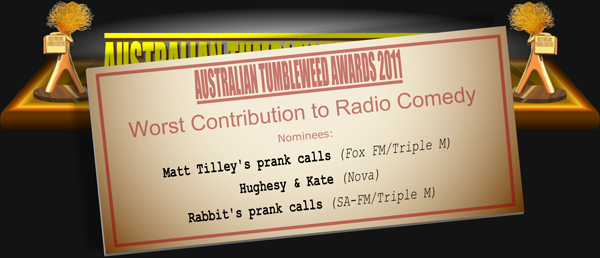 Over the years we have resigned ourselves to the fact that the comedic aspirations of commercial radio stations extend no further than idiotic yammering and prank calls. Matt Tilley is of course the ultimate exponent of this, successfully combining the two on an increasing number of Austereo breakfast shows. Over in Adelaide, Rabbit from the SA-FM breakfast show is doing much the same.
Over the years we have resigned ourselves to the fact that the comedic aspirations of commercial radio stations extend no further than idiotic yammering and prank calls. Matt Tilley is of course the ultimate exponent of this, successfully combining the two on an increasing number of Austereo breakfast shows. Over in Adelaide, Rabbit from the SA-FM breakfast show is doing much the same.
Hughesy & Kate of Melbourne’s Nova are more focused on the yammering side of commercial radio comedy; trying to grab attention with their loud-mouth tomfoolery as their half-listening audience spoon cereal in to their mouths, gets the kids organised or travel in to work. As such it is hard not to interpret Ed Kavalee’s decision to leave their show as cut and dry editorial comment. Making films that never seem to appear in cinemas or appearing on a sports panel show has got to be better than hanging out with them.
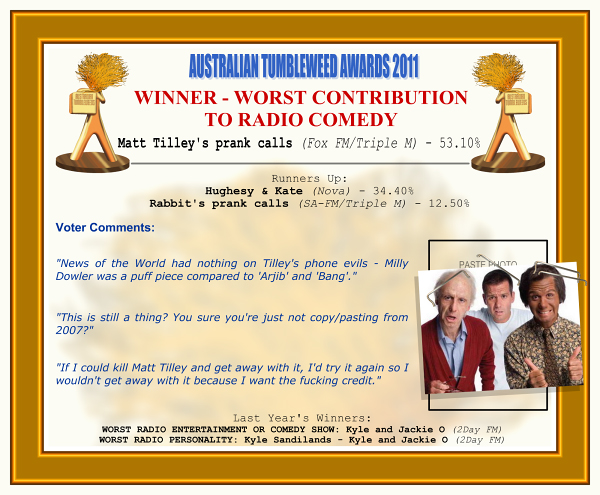 On the one hand it is hardly worth analysing the work of Matt Tilley. He is basically just a man putting on stupid accents and trying to make someone get angry by bullying and haranguing them. If you find that sort of thing funny you’ll be pleased to hear there’s lots more of it coming up in 2012. We, on the hand, have been somewhat disturbed to find ourselves nostalgic for the days when Merrick & Rosso would leave a message on people’s answering machines from Dr Sarkis Kockoff – at least there was wordplay in that one.
On the one hand it is hardly worth analysing the work of Matt Tilley. He is basically just a man putting on stupid accents and trying to make someone get angry by bullying and haranguing them. If you find that sort of thing funny you’ll be pleased to hear there’s lots more of it coming up in 2012. We, on the hand, have been somewhat disturbed to find ourselves nostalgic for the days when Merrick & Rosso would leave a message on people’s answering machines from Dr Sarkis Kockoff – at least there was wordplay in that one.
THE RESULTS OF THE NEXT CATEGORY, WORST NON-BROADCAST COMEDY OR COMEDY PRODUCT, WILL BE ANNOUNCED AT 3:30PM EDT.
Australian Tumbleweed Awards 2011 – Worst Overall Channel / Network for Comedy
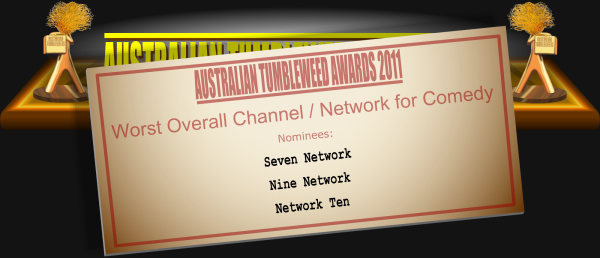 All three commercial networks have been doing their best to make Australian comedy a no-go zone for years now. Ten may have made a concerted effort to at least show some comedy, but Talkin’ ‘bout Your Generation has trapped Shaun Micallef in an increasingly tired game show and Good News World was an insult even to the fans of its previous, almost as dull and predictable incarnations. Seven left comedy well alone in 2011, which isn’t going to get any complaints from us after the string of rapidly cancelled quasi-game shows they tried in previous years, and Nine… well, their heart was in the right place.
All three commercial networks have been doing their best to make Australian comedy a no-go zone for years now. Ten may have made a concerted effort to at least show some comedy, but Talkin’ ‘bout Your Generation has trapped Shaun Micallef in an increasingly tired game show and Good News World was an insult even to the fans of its previous, almost as dull and predictable incarnations. Seven left comedy well alone in 2011, which isn’t going to get any complaints from us after the string of rapidly cancelled quasi-game shows they tried in previous years, and Nine… well, their heart was in the right place.
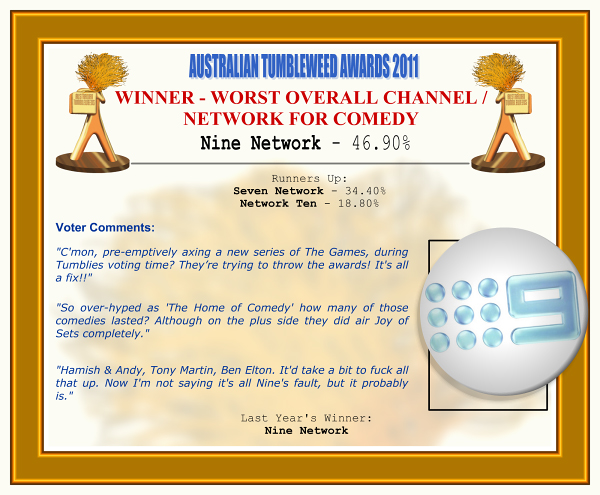 Nine tried to get into the comedy business in 2012 in a way no commercial network had tried in more than a decade. They hired big name stars, they promoted the hell out of them and they put them on in prime time where people could actually see them. Unfortunately, they did all this on Channel Nine, the oldest-skewing of the networks and the one where viewers – families and old folk, in the main – had the least possible interest in being made to laugh. Hamish & Andy’s Gap Year kind of worked, thanks to a massive pre-existing fanbase and a general likeability that didn’t scare the oldies away; nothing else really stood a chance.
Nine tried to get into the comedy business in 2012 in a way no commercial network had tried in more than a decade. They hired big name stars, they promoted the hell out of them and they put them on in prime time where people could actually see them. Unfortunately, they did all this on Channel Nine, the oldest-skewing of the networks and the one where viewers – families and old folk, in the main – had the least possible interest in being made to laugh. Hamish & Andy’s Gap Year kind of worked, thanks to a massive pre-existing fanbase and a general likeability that didn’t scare the oldies away; nothing else really stood a chance.
THE RESULTS OF THE NEXT CATEGORY, WORST CONTRIBUTION TO RADIO COMEDY, WILL BE ANNOUNCED AT 3:00PM EDT.
Australian Tumbleweed Awards 2011 – Worst Overall Comedy
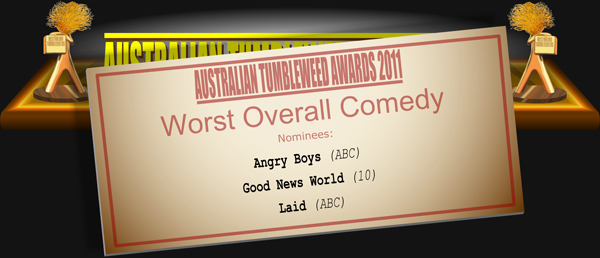 In previous years many of the results thrown up by the Tumblies have been dismissed as simply the scowling of haters opposed to anything mainstream or popular. Unfortunately for those people, the main players in this year’s awards were high profile, well-promoted ratings flops, suggesting that – for once – our voters and the mainstream are on the same page. Self-serving tripe that seems to have been put together more to stroke the egos of the creators or fulfil some regulated programming need doesn’t seem to have put bums on seats in 2011; turns out people actually do want to watch comedy that’s funny after all.
In previous years many of the results thrown up by the Tumblies have been dismissed as simply the scowling of haters opposed to anything mainstream or popular. Unfortunately for those people, the main players in this year’s awards were high profile, well-promoted ratings flops, suggesting that – for once – our voters and the mainstream are on the same page. Self-serving tripe that seems to have been put together more to stroke the egos of the creators or fulfil some regulated programming need doesn’t seem to have put bums on seats in 2011; turns out people actually do want to watch comedy that’s funny after all.
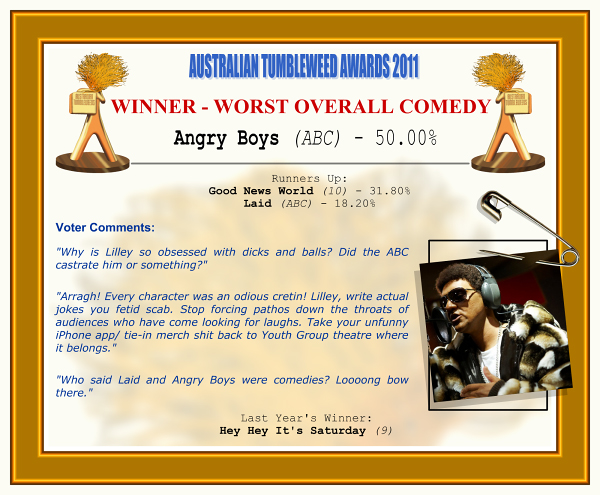 What, it seems fair to ask at this stage, is Chris Lilley trying to do? Usually with a comedy show answering that question is simple: it’s supposed to make us laugh. But for large stretches of Angry Boys it was obvious that Lilley didn’t want laughs – in fact, laughing at Gran’s Alzheimer’s announcement (for example) would be exactly what he didn’t want. This is hardly new or original in comedy – the end of both Blackadder Goes Forth and the second series of the UK Office pulled off the same trick – but those shows used sentiment as a twist ending, adding a surprise layer to a previously purely comedic character. Lilley puts sentiment at the heart of his characters from the outset. Presumably it’s some kind of achievement to make an audience care about a senile old lady or loutish teen who is clearly played by a 40-ish man in a wig: it’s just not an achievement in comedy.
What, it seems fair to ask at this stage, is Chris Lilley trying to do? Usually with a comedy show answering that question is simple: it’s supposed to make us laugh. But for large stretches of Angry Boys it was obvious that Lilley didn’t want laughs – in fact, laughing at Gran’s Alzheimer’s announcement (for example) would be exactly what he didn’t want. This is hardly new or original in comedy – the end of both Blackadder Goes Forth and the second series of the UK Office pulled off the same trick – but those shows used sentiment as a twist ending, adding a surprise layer to a previously purely comedic character. Lilley puts sentiment at the heart of his characters from the outset. Presumably it’s some kind of achievement to make an audience care about a senile old lady or loutish teen who is clearly played by a 40-ish man in a wig: it’s just not an achievement in comedy.
THE RESULTS OF THE NEXT CATEGORY, WORST OVERALL CHANNEL/NETWORK FOR COMEDY, WILL BE ANNOUNCED AT 2:30PM EDT.
Australian Tumbleweed Awards 2011 – Worst Film Comedy
 Snowtown is what Australian film does best: a grim tale of bogans murdering each other. Well, okay, it’s not what Australian film does best – it’s more that it’s what the people who make Australian film like to think they do best. Go on, go enrol at a film school and tell everyone you want to make light-hearted romantic comedies. We’ll wait here.
Snowtown is what Australian film does best: a grim tale of bogans murdering each other. Well, okay, it’s not what Australian film does best – it’s more that it’s what the people who make Australian film like to think they do best. Go on, go enrol at a film school and tell everyone you want to make light-hearted romantic comedies. We’ll wait here.
Big Mamma’s Boy was a return to the classic wog comedy that… wait, wasn’t there a wog comedy just last year? And wasn’t that the only real candidate for this award then? Surely it’s the Vietnamese’s turn by now?
Here’s a test: have you ever heard anyone tell a “little Johnny” joke? Do you even know what a “little Johnny” joke is? Because we don’t and we’re supposed to be experts in this kind of Ocker down home Aussie comedy thing. And by “experts”, we mean we’ve listened to our fair share of King Billy Cokebottle.
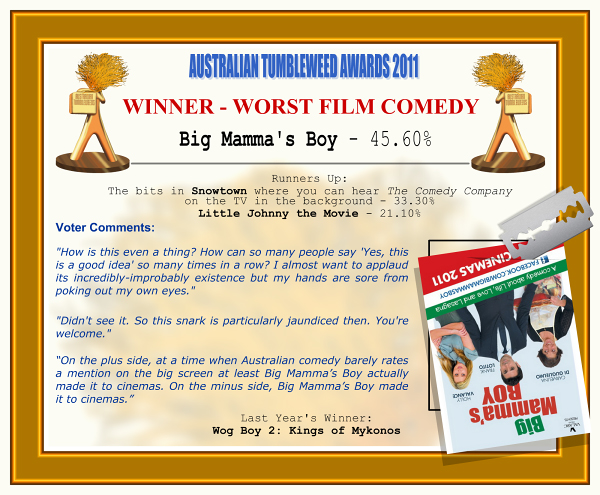 In yet another dire year for Australian big screen comedy, Big Mamma’s Boy basically wins here by default. That’s not to say it didn’t have problems: in 2011 a romantic comedy where the lead rushes to get married largely to prove he isn’t gay isn’t so much hilarious as offensive. But it least it tried. Mostly it tried to see how many times it could get away with the old “It looks like he’s getting a blow job – BUT HE’S NOT!!” joke, but when it comes to getting laughs from Australian film that’s still a big step up from the usual pile of dismembered bogans.
In yet another dire year for Australian big screen comedy, Big Mamma’s Boy basically wins here by default. That’s not to say it didn’t have problems: in 2011 a romantic comedy where the lead rushes to get married largely to prove he isn’t gay isn’t so much hilarious as offensive. But it least it tried. Mostly it tried to see how many times it could get away with the old “It looks like he’s getting a blow job – BUT HE’S NOT!!” joke, but when it comes to getting laughs from Australian film that’s still a big step up from the usual pile of dismembered bogans.
THE RESULTS OF THE NEXT CATEGORY, WORST OVERALL COMEDY, WILL BE ANNOUNCED AT 2:00PM EDT.
Australian Tumbleweed Awards 2011 – Worst Sketches
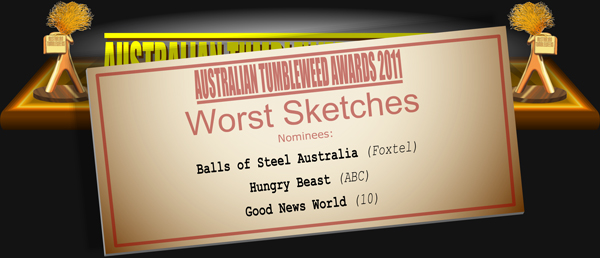 Sketch comedy, like radio comedy, is a writer’s medium. Performers are important too, but unless the writing is sharp a sketch show is sunk.
Sketch comedy, like radio comedy, is a writer’s medium. Performers are important too, but unless the writing is sharp a sketch show is sunk.
Balls of Steel Australia, being a pranks show, didn’t really have writers, just some obscure attention-seekers who’d been assigned an annoying character or quirk. On one level it was better than Good News World – the level where it didn’t have aspirations to be anything other than a pointless time-filler, and can therefore be said to have not failed.
The now axed Hungry Beast focused a bit more on the serious side of its remit in 2011. Much of their comedy output seemed to be sub-Chaser street interviews or sketches which assumed hilarity would ensue if serious topics were expressed through hip hop. See “I’m A Climate Scientist“ if you want an example of the latter.
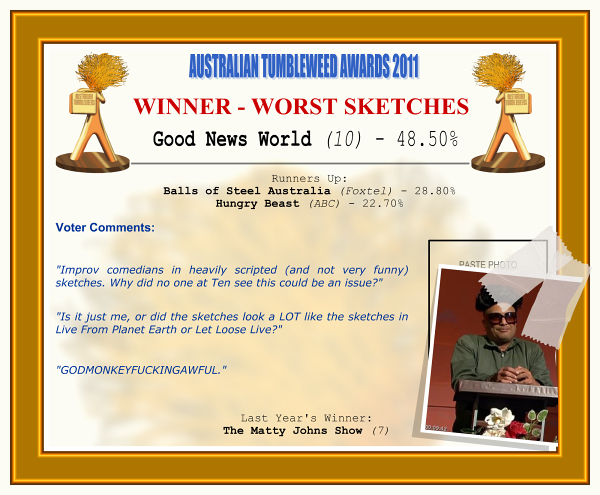 Many of us would like to see a revival of good, topical sketch comedy on Australian television, but this year’s winner did little other than prove once again that this will not be possible without a Year Zero approach. Good News World had a very experienced cast and writing team, many of whom have written for some decent and notable shows, so…what went wrong? Did an entire world of news not provide enough scope for them? Given the number of times Akmal turned up as Colonel Gaddafi that is a distinct possibility. Or was it more that those involved just aren’t very good at their jobs?
Many of us would like to see a revival of good, topical sketch comedy on Australian television, but this year’s winner did little other than prove once again that this will not be possible without a Year Zero approach. Good News World had a very experienced cast and writing team, many of whom have written for some decent and notable shows, so…what went wrong? Did an entire world of news not provide enough scope for them? Given the number of times Akmal turned up as Colonel Gaddafi that is a distinct possibility. Or was it more that those involved just aren’t very good at their jobs?
THE RESULTS OF THE NEXT CATEGORY, WORST FILM COMEDY, WILL BE ANNOUNCED AT 1:30PM EDT.
Australian Tumbleweed Awards 2011 – Worst Game or Panel Show
Panel shows in which kinda known people from breakfast radio, the stand-up scene and, increasingly, other panel shows improvise funny answers to questions have all but replaced scripted offerings such as sketch and variety shows. You can see the appeal to producers – sketch and variety is expensive and often risky. The problem is that by avoiding the risk of not being funny, they just end up with bland.
Can of Worms promised to delve into the complexities of our attitudes to various social issues, but succeeded in doing little more than skim over the surface of all of them. Good News Week did exactly the same, but to such an extent that even its makers realised it need a re-think – unfortunately that re-think didn’t involve axing the team entirely.
Before it aired The Trophy Room seemed to have it all – Australians love sport and panel shows, right? So putting them together would definitely work? Um, no. Even ABC audiences are prepared to call time on a show which looks poor in comparison to the ageing repeats and dud imports that litter the commercial networks over summer.
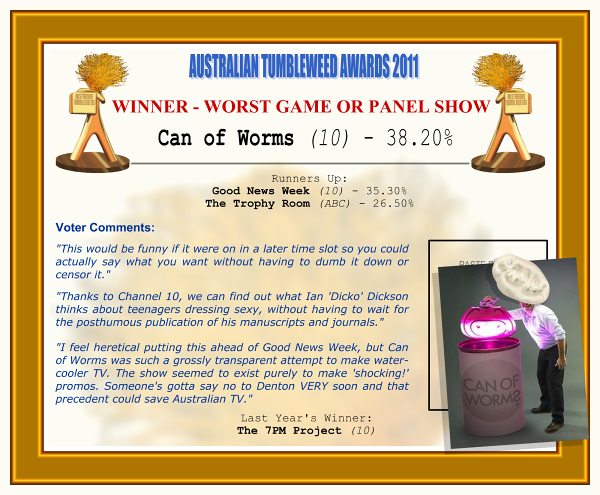 The problem with Can of Worms wasn’t so much that it took a number of existing ideas, changed them a bit and put them to air – that’s basically all television ever does – it was more that it took a series of “bound to shock” attitudes, coaxed them into being expressed by some B-list celebrities and then assumed this would be enough to entertain us.
The problem with Can of Worms wasn’t so much that it took a number of existing ideas, changed them a bit and put them to air – that’s basically all television ever does – it was more that it took a series of “bound to shock” attitudes, coaxed them into being expressed by some B-list celebrities and then assumed this would be enough to entertain us.
THE RESULTS OF THE NEXT CATEGORY, WORST SKETCHES, WILL BE ANNOUNCED AT 1:00PM EDT.
Australian Tumbleweed Awards 2011 – Worst Sitcom or Dramedy
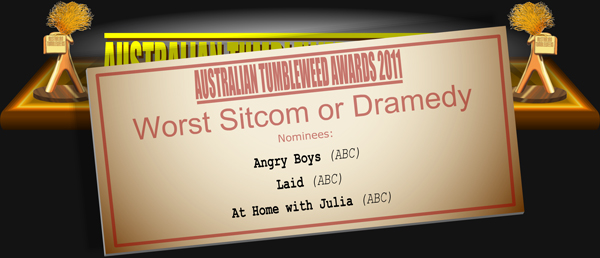 In recent years we’ve seen an upsurge in the number of locally-made sitcoms. And thanks to the trend over the past decade or so for shooting on location and beefing up the drama quotient, there’s now almost no need to include anything in your sitcom which is capable of making a real life audience laugh.
In recent years we’ve seen an upsurge in the number of locally-made sitcoms. And thanks to the trend over the past decade or so for shooting on location and beefing up the drama quotient, there’s now almost no need to include anything in your sitcom which is capable of making a real life audience laugh.
Take Chris Lilley’s long-awaited series Angry Boys, which was praised for its realism, and complexity, and for the way it hit the target with niche audiences. Niche audiences were so fundamental to the show, apparently, that even the show’s social media producer was out there talking it up. That’s great and all, but aren’t we, the rusted-on audience for Australian comedy, a sort of a niche anyway? Where’s the targeting of us?
In comparison, Laid seemed to be trying to be an actual sitcom, as opposed to a cynical marketing exercise. And if you didn’t like the style of humour there was at least a plot to follow. If you didn’t like the plot you were kinda buggered, though.
As for At Home with Julia, it was an easy watch and it had some laughs, but by focusing on the home life of Julia Gillard and Tim Mathieson rather than the professional life of Julia Gillard it missed a lot of opportunities to serve up some comedic insights into our political system. Actually, on second thoughts, whenever the show did attempt a bit of satire it was so surface-level they needn’t have bothered. So perhaps they pitched it just right.
Like Chris Lilley’s past work Angry Boys looked impressive because it was a series of character studies on a scale not often attempted in Australian television. Problem is, none of the years of Lilley’s detailed research and improvisation, on and off camera, mattered a jot because the end product was boring, unfunny and went on for way too long – as free-falling audience ratings on at least two continents have now demonstrated.
THE RESULTS OF THE NEXT CATEGORY, WORST GAME OR PANEL SHOW, WILL BE ANNOUNCED AT 12:30PM EDT.

